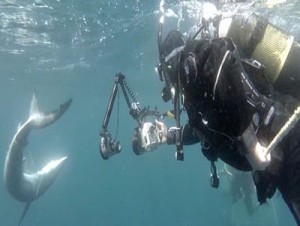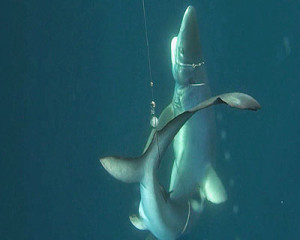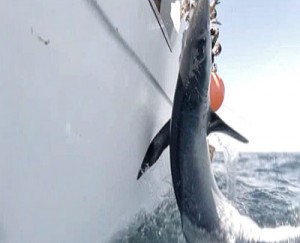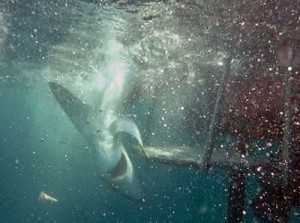Marine Life & Conservation
UK Blues – are sharks being stressed out in the name of science or to make a few quid from tourists?
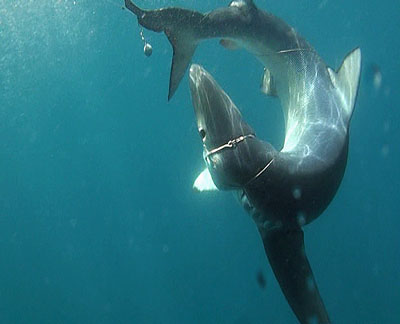
I was recently invited to a Blue Shark diving day in the UK. I am being a bit vague about where because my article really is a generic one and not aimed at anyone specifically.
The day started with laying out a trail of chum as we drifted. In this ‘scent trail’ the skipper set a line and baited hook for catching a shark with the intent of bringing it on board, showing the guests, taking measurements for research statistics and then letting it go.
Over the years as a TV wildlife filmmaker I have come across many such trips of which some are good and others really bad. Sometimes the quest for good research and care for the animals is diminished behind the need to make each trip pay financially by entertaining guests with a ‘shark experience’.
It was not long before the first shark was hooked and being played alongside the boat. A few of the guest divers were quickly in the water in the hope of seeing the shark swim past. Having tried to dive deep to safety, the shark, now nearing total exhaustion fights with the last of its energy, twisting and thrashing against the line holding it. For me this is a very sad sight and I know at least two of the divers left the water close to tears. At the same time, others thought this was great excitement.
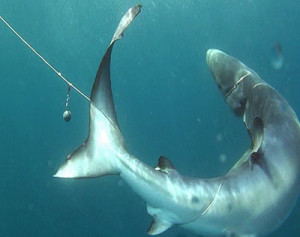 Getting wrapped in the line during this period can be harmful to the shark as well as increasing the time for lactic acid to build up in the muscle tissue which is one of the contributors to the inability of the shark to recover when released. Ideally the shark should be brought in as quickly as possible and so released the same.
Getting wrapped in the line during this period can be harmful to the shark as well as increasing the time for lactic acid to build up in the muscle tissue which is one of the contributors to the inability of the shark to recover when released. Ideally the shark should be brought in as quickly as possible and so released the same.
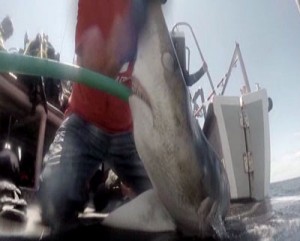 It was hauled by the hook and line over the side of the boat where a hose pipe was immediately pushed into its mouth to give a flow of water through its gills in order to help keep the shark alive while measurements were taken and people held the shark in their arms for a photo.
It was hauled by the hook and line over the side of the boat where a hose pipe was immediately pushed into its mouth to give a flow of water through its gills in order to help keep the shark alive while measurements were taken and people held the shark in their arms for a photo.
The internal skeleton of a shark is made of cartilage and connective tissue making the shark very flexible and light. The shark has no rib cage, so when it is on land its own weight can literally crush its internal organs. Hence the longer it is on the deck the more damage is done. Also when pulling a shark up and over the side of the boat, the internal organs are pulled by gravity to the lower end of the body. Generally it is far better not to bring any shark on board that is over a meter in length. Any science such as measuring and tagging should be done in the water when ever possible.
If it is necessary to bring a shark aboard then the technique recommended by many marine biologists is to use a sling at the side of the boat bringing the fish alongside and into it. Then lift it horizontally and gently onto the deck. I have done this myself and found it to be very workable and this method decreases the stress and strain on the shark. This sling can then be used to lower the shark back into the water.
At this stage there should be no reason to keep it out of the water for more that a few minutes. I have talked to shark biologists about the practice of putting the hose in its mouth and continually flushing the gills. The over-riding opinion is that this is not a good idea, or necessary, as it is likely to damage the gill tissues and so severely reduce the shark’s ability to recover. However, others are convinced that this hose pipe action does work and is necessary.
Finally the shark was released and lowered back into the water where it finned slowly while sinking out of sight into the depths. Did it live or die? We don’t know. The general consensus from the majority of marine biologists is that the rate of survival is good when care is taken to keep the shark free from over stress and physical damage.
We will forever debate the pros and cons of various opinions on how best to carry out our shark research, while at the same time, caring for the welfare of the individual animals. But in the end, it is the sharks who are paying the terrible price of pain and annihilation. To me we are simply recording statistics of the shark’s demise.
I sat on the boat after the shark was released and found myself gazing at all the incredible technology that lay in front of me. Diving equipment that allows us to explore the underwater world, computers that keep us safe from decompression, clever materials that keep us warm and dry. In the wheelhouse, the navigation equipment, the radar, the depth profilers, the coffee machine. Yet, with all this, we still find the need to put a hook into a shark’s mouth, drag it from the sea and possibly kill it all in the name of science and research. In many ways the human race has come a long way forward from the days of kill or be killed, but at the same time we seem to have kept one foot firmly in our primitive past.
So what do you think? Is it worth stressing out this magnificent creatures in this way to gain scientific research, or is the risk to their health just too high? Let us know in the comments section below.
Marine Life & Conservation
Paul Watson Released as Denmark Blocks Japan’s Extradition Bid

Renowned anti-whaling activist Paul Watson has been released from custody in Greenland after spending five months in detention. Denmark’s Justice Ministry rejected Japan’s request for his extradition, citing insufficient guarantees that his time already served in custody would be credited against any potential sentence.
The 74-year-old Canadian-American was arrested on July 21 in Nuuk, Greenland’s capital, when his ship docked to refuel. His arrest was based on a 2012 Japanese warrant related to a 2010 encounter in Antarctic waters. Japan alleged Watson obstructed operations and caused damage to a whaling research ship during efforts to disrupt illegal whaling. Watson has consistently denied these claims, maintaining his commitment to marine conservation.
Denmark, which oversees extradition matters for Greenland, concluded that while the legal conditions for extradition were met, the lack of assurances from Japan regarding time-served credit made extradition untenable.
In a video shared by his foundation, Watson expressed gratitude and relief, saying, “After five months, it’s good to be out… and good to know they’re not sending me to Japan.” He added that the most difficult part of his time in custody was being separated from his two young sons.
Watson is a pioneering figure in marine conservation, known for founding the Captain Paul Watson Foundation in 2022 after decades of activism with the Sea Shepherd Conservation Society. His bold efforts to defend marine life have earned him widespread support, including from celebrities and conservationists. His work has also been featured in the acclaimed reality TV series Whale Wars.
Watson’s lawyer, Jonas Christoffersen, praised the decision, stating, “We are happy and relieved that Paul Watson is now free.” He added that Watson is eager to reunite with his family and continue his vital work.
The arrest occurred while Watson’s vessel, the M/Y John Paul DeJoria, was en route to the North Pacific with a team of 26 volunteers to intercept a Japanese whaling ship. His foundation described the arrest as politically motivated and emphasized that Watson’s actions were focused on ending illegal whaling practices.
Japan resumed commercial whaling in 2019 after leaving the International Whaling Commission, asserting that whale meat is a cultural tradition. Conservationists, however, continue to challenge these practices, highlighting their impact on marine ecosystems.
Despite the challenges, Watson remains steadfast in his mission to protect marine life and bring attention to whaling practices. His dedication to ocean conservation has made him a globally respected advocate for the environment.
Marine Life & Conservation
12 Days of Zero-Waste Fish-mas

This holiday period, the Marine Conservation Society, the UK’s leading ocean membership charity, invites you to make some simple changes to eating fish this Christmas to help our seas.
Dr Kenneth Bodles, Head of Fisheries and Aquaculture at the Marine Conservation Society, said, “During the festive season, our consumption increases, but so does waste. Sustainability isn’t just about where food comes from – it’s also about how you use it. By reducing waste and making the most out of your seafood, you’re not only taking steps to be more ocean-friendly, but can also help to cut costs during what is often one of the most expensive times of the year”.
The Marine Conservation Society has compiled twelve tips on how to consume seafood sustainably with zero-waste this Christmas:
Buy whole fish instead of fillets
Instead of fillets, consider buying whole fish such as salmon, hake, or lemon sole. By adopting a “nose to tail” approach with cooking, whole-baked fish not only feeds a crowd, but also helps to minimise waste and maximise sustainability by using up every part of the animal, including bones, skin, and fat.
Make fish stock
Leftover fish bones or shells can be put to good use by boiling them to make a nourishing fish stock or bisque. This can be frozen and preserved for later use and makes for a flavourful base in a soup.
Make your own fish pâté
Avoid waste by turning leftover fish, such as smoked mackerel or salmon, into a delicious pâté by blending with cream cheese and lemon. Perfect when paired with crackers.
The sustainability of salmon and mackerel varies depending on where and how it is caught or farmed. For more information on green-rated options, check the charity’s Good Fish Guide.
Buy frozen
By purchasing seafood that is frozen or vacuum-packed, this helps to reduce waste by extending the shelf life of your food.
Fish pie
If you’re wondering what to do with leftover cooked fish, why not opt for a classic fish pie with mashed potatoes, leeks, and a cheesy sauce? A sure crowd pleaser on Boxing Day.
Use the head
Don’t forget the fish head! The meat is incredibly tender and flavourful. The charity recommends a cod’s head curry or recreating Fallow’s renowned cod’s head in siracha butter.
By stretching your ingredients further, not only is this a more sustainable way to enjoy seafood, but also cost-effective by repurposing leftovers and cooking creatively.
Boxing Day brunch
Mix leftover kippers or smoked salmon with scrambled eggs for a tasty, zero-waste, Boxing Day brunch.
For best choice, make sure you buy kippers, or herring, from the North Sea and the North Irish Sea.
Zero-waste storage
A top tip from the Marine Conservation Society to avoid waste is freezing fish offcuts to save for future use.
Crisp up the skin
Even leftover fish skin can be turned into a quick savoury snack by crisping it up in an air fryer with a little olive oil and salt.
Anchovies two ways
Leftover anchovies can either be blended with butter to make a delicious anchovy butter or tossed into pasta for a hit of umami flavour.
The charity recommends opting for anchovies caught in the Bay of Biscay for best choice.
Fishcakes
For an easy, zero-waste meal, leftover seafood trimmings can be mixed with mash and fried in breadcrumbs to make fishcakes.
Pickled mussels
Try pickling mussels in 1:1 vinegar and water, with a dash of sugar for a sustainable, zero-waste snack that can be enjoyed well beyond the festive season.
Mussels farmed in the UK are a seafood superhero. Grown using low-impact methods and harvested by hand, they get all the food they need from the sea around them. This makes them one of the most sustainable, ocean-friendly, and cost-effective seafood options.
Players of People’s Postcode Lottery have raised £6.6M towards the Marine Conservation Society’s vital work in making seafood more sustainable.
Laura Chow, Head of Charities at People’s Postcode Lottery, said: “Fish is a festive favourite for many, but making sustainable choices when it comes to how we buy and eat seafood makes all the difference for our ocean. Support from players of People’s Postcode Lottery has helped the Marine Conservation Society further its sustainable seafood work, so that we can all enjoy healthier, better protected seas.”
The Marine Conservation Society encourages you to make sustainable seafood choices a year-round habit, not just for Christmas. To check how sustainable the seafood on your plate is, you can visit the charity’s Good Fish Guide. The Guide helps consumers and businesses identify the most sustainable seafood using a simple traffic light system, based on where and how species are caught or farmed. Green is the best choice, amber means improvements are needed, and red indicates fish to avoid buying.
Zero-waste gift idea
Why not embrace a zero-waste Christmas by gifting a membership to support marine conservation? It’s a meaningful, low-waste gift that helps protect our ocean for generations to come. Memberships start from as little as £5 a month – the price of a sandwich and drink from your local coffee shop.
Find the latest sustainable seafood advice for wild-caught and farmed seafood on the Good Fish Guide, downloadable to your phone from www.mcsuk.org/goodfishguide.
-

 News2 months ago
News2 months agoIconic SS United States to become the World’s Largest Artificial Reef
-

 News3 months ago
News3 months agoBook Review – 52 Assignments: Underwater Photography
-

 Gear News3 months ago
Gear News3 months agoDYNAMICNORD – New German diving brand enters the British market
-

 News3 months ago
News3 months agoExploring Cenote El Pit: A Diver’s Dream
-

 Gear News3 months ago
Gear News3 months agoTry BARE drysuits (and maybe even win one!) this Friday with Sea & Sea at North West Dive Fest
-

 Marine Life & Conservation3 months ago
Marine Life & Conservation3 months agoBook Review: Coral Triangle Cameos
-

 Blogs2 months ago
Blogs2 months agoDive the Egyptian Red Sea this Autumn with Regaldive
-

 News3 months ago
News3 months ago2024 Ocean Art Underwater Photo Competition Announced


